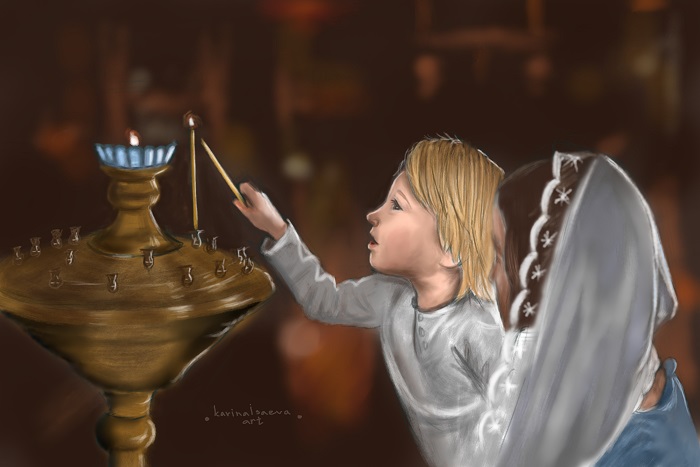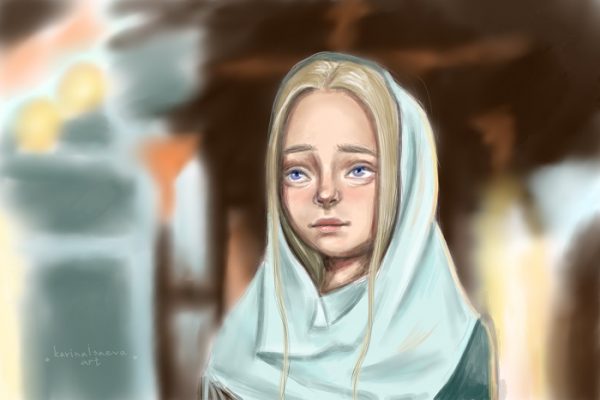There were saints who raised their own children to become saints, too. Their experience clearly confirms a favorite saying of Metropolitan Anthony (Bloom) of Sourozh, “No one can turn to God unless he sees a glimpse of eternal life in another person’s face.”
Saint Nonna, the mother of Gregory the Theologian, was wary of letting her son go to the best school of their time – the Academy in Athens, which had been founded by Plato himself. There were few opportunities for the residents of Cappadocia, where the family lived, to provide a high-quality education for their children in the middle of the 4th century. Christianity had been established as the official religion not long before that. Athens remained the capital of pagan culture. Nonna was a Christian, and she wanted her son to remain a Christian when he grew up. That was why the first thing she taught the little Gregory was talking with God. The mother believed that the habit of prayer would reliably protect her son from temptations. She taught him by her own example, too. It was around that time that another young man named Julian, a nephew of Constantine the Great, studied in Athens. He would later become the emperor and be nicknamed the Apostate for his attempt to restore paganism. Gregory was immune to the pagan “infection”, though. His mother’s example must have played a decisive role. The young man was primarily attracted to being on his own, pondering on profound philosophical and theological issues, and praying to God.
Basil and Emily, the parents of Saint Basil the Great, inherited their deep faith from their own parents who had suffered for Christ. Soon, Basil’s father died, and Emily took the elementary education of their children into her own hands. She was deeply concerned by the possible corruption of her children by salacious pagan practices, so she took care to protect and teach her children only the matters that she considered to be right and useful while they were young. The mother excluded all morally questionable things out of her kids’ life. She gave them errands to make sure that they didn’t get bored. It played a major role in the later lives of Saint Emily’s children. Five of them were canonized by the Church: Saint Basil the Great, Saint Gregory of Nyssa, Saint Peter of Sebaste, Saint Macrina, and Holy Righteous Theosebia the Deaconness.

Archpriest Alexius Mechov was a strict father to his children while they were small. Everything changed when his wife died in 1902 and Father Alexius was left alone with four kids. He could not abandon his priestly ministry. Father John of Kronstadt who visited him soon after his wife’s death insisted that he was to keep working with people and “lifting up their burdens”. Father Alexius entrusted daily care of his children to his wife’s sister Olga Petrovna. He spent his free time with them. He became much more tolerant towards his kids. Olga Petrovna used to warn Father Alexius that his lenient attitude would damage his kids. He would reply, “Remember that they are motherless.” As a result, Father Alexius’s tenderness and compliancy yielded good fruit: two of his daughters became school teachers. His son became a priest and went through prisons, exiles, and labor camps during the persecution of the Church. He was executed in 1942. Fifty-eight years later, he was canonized by the Russian Church as a hieromartyr. His father, Holy Righteous Alexius Mechov, was canonized on the same day.
It seemed likely that there wasn’t anyone wealthier in the world in the beginning of the 20th century than the Russian tsar. Nevertheless, the tsar’s children weren’t raised in luxury. They were taught to sleep on cots and eat small amounts of simple food. The princesses would wear their older sisters’ clothes. If their clothes were torn or battered, they would mend them with their own hands. When the First World War broke out, they spent hours working in hospitals together with their mother, the Empress. They would take care of the wounded, assist surgeons, and patch wounds. The emperor and his daughter enjoyed working hard even later, when they were under arrest in Tsarskoye Selo. They would uproot stubs, make flower beds, and cut tree branches. Their habit of frugal living and helping everyone who needed their help was especially important for them in the course of the last months of their lives. Their guards never heard them complain of inadequate living conditions.
We tend to think that if we talk with our children about God as often as possible, if we take them to church regularly for communion and watch out lest they get into a bad company or spend too much time on the internet or watching TV without our supervision, it’ll guarantee their remaining in the fold when they grow up. However, it will be much easier for the kids to love God if they see their parents love Him and if they are able to recognize the expression of their parents’ love of God in their daily lives and in their dealings with others.
Translated by The Catalog of Good Deeds














